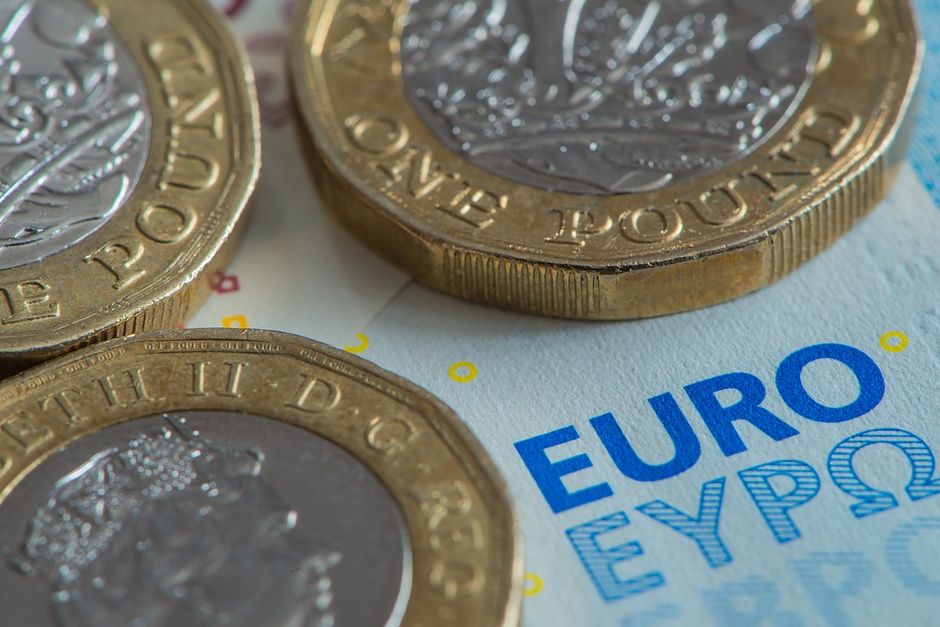EUR/GBP jumps closer to mid-0.8300s, upside potential seems limited
- EUR/GBP gains some positive traction after comments from ECB’s Pierre Wunsch.
- Bets for more aggressive ECB rate cuts might keep a lid on any meaningful gains.
- Traders also prefer to wait for the German and Eurozone CPI reports later this week.

The EUR/GBP cross attracts some buyers following an intraday dip to the 0.8315 region at the start of a new week and reverses a major part of Friday's modest decline. Spot prices climb to a fresh daily high during the first half of the European session and currently trade around the 0.8340 area, up just over 0.10% for the day.
The shared currency gets a minor lift following comments from the European Central Bank (ECB) policymaker Pierre Wunsch, saying that a temporary and small undershoot of the inflation target due to energy price swings is acceptable. Wunsch added that it is premature to discuss the December policy decision and that there is no urgency in further accelerating the easing of monetary policy. This, in turn, is seen as a key factor offering some support to the EUR/GBP cross.
Apart from this, the uptick could be attributed to some technical buying in the vicinity of the 0.8300 pivotal support, which has been acting as a strong base for spot prices since late September. Any meaningful upside, however, seems elusive in the wake of bets for more aggressive interest rate cuts by the ECB, bolstered by a fall in the Eurozone consumer inflation below the central bank's 2% target for the first time since June 2021 and sluggish economic growth.
The British Pound (GBP), on the other hand, might continue to draw support from expectations that the Bank of England's (BoE) rate-cutting cycle is more likely to be slower than in the Eurozone. This might further contribute to capping the upside for the EUR/GBP cross in the absence of any relevant economic data. Traders might also prefer to wait for this week's release of flash German and Eurozone CPI prints on Wednesday and Thursday, respectively.
ECB FAQs
The European Central Bank (ECB) in Frankfurt, Germany, is the reserve bank for the Eurozone. The ECB sets interest rates and manages monetary policy for the region. The ECB primary mandate is to maintain price stability, which means keeping inflation at around 2%. Its primary tool for achieving this is by raising or lowering interest rates. Relatively high interest rates will usually result in a stronger Euro and vice versa. The ECB Governing Council makes monetary policy decisions at meetings held eight times a year. Decisions are made by heads of the Eurozone national banks and six permanent members, including the President of the ECB, Christine Lagarde.
In extreme situations, the European Central Bank can enact a policy tool called Quantitative Easing. QE is the process by which the ECB prints Euros and uses them to buy assets – usually government or corporate bonds – from banks and other financial institutions. QE usually results in a weaker Euro. QE is a last resort when simply lowering interest rates is unlikely to achieve the objective of price stability. The ECB used it during the Great Financial Crisis in 2009-11, in 2015 when inflation remained stubbornly low, as well as during the covid pandemic.
Quantitative tightening (QT) is the reverse of QE. It is undertaken after QE when an economic recovery is underway and inflation starts rising. Whilst in QE the European Central Bank (ECB) purchases government and corporate bonds from financial institutions to provide them with liquidity, in QT the ECB stops buying more bonds, and stops reinvesting the principal maturing on the bonds it already holds. It is usually positive (or bullish) for the Euro.
Author

Haresh Menghani
FXStreet
Haresh Menghani is a detail-oriented professional with 10+ years of extensive experience in analysing the global financial markets.

















